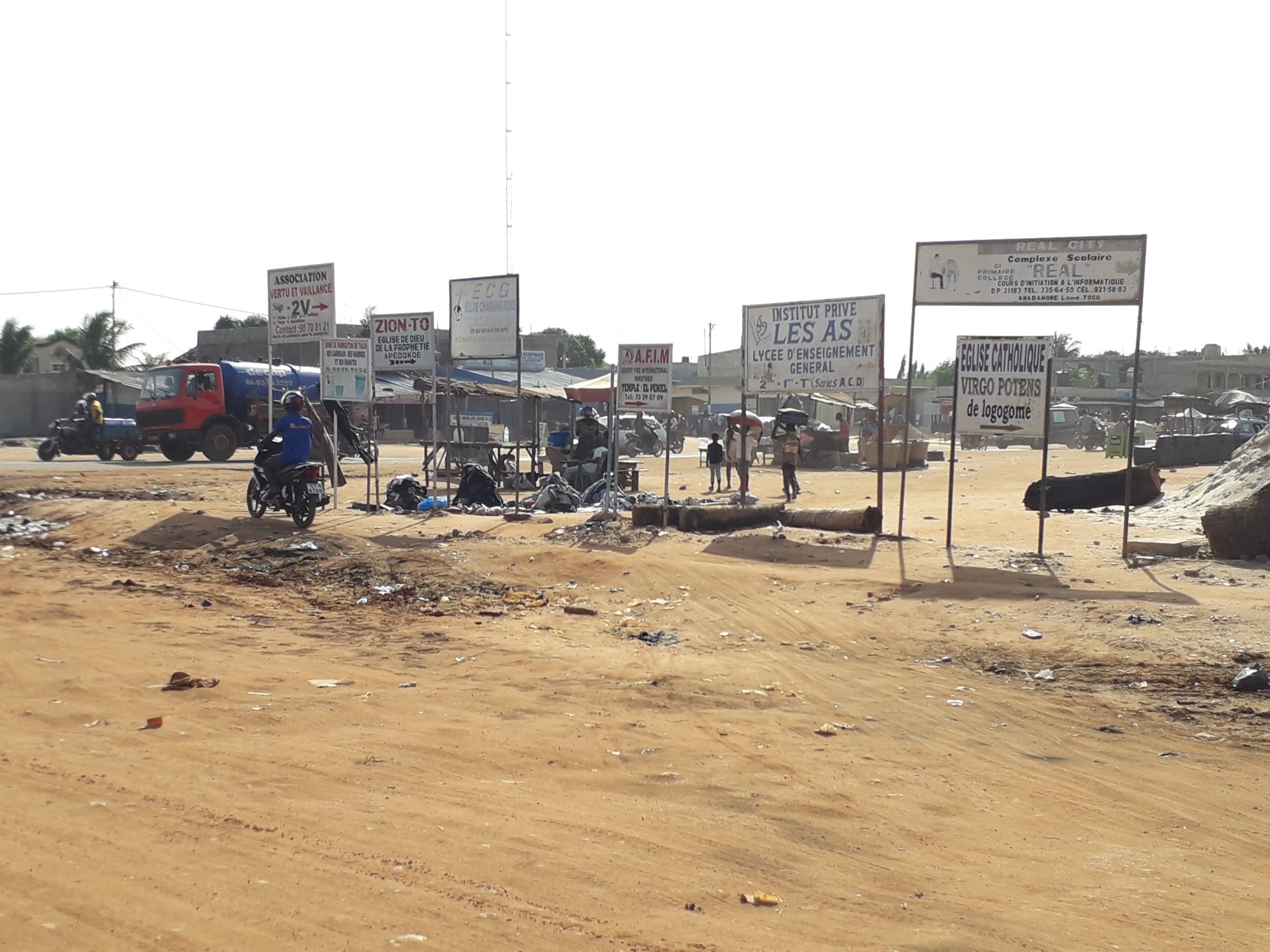La Guerre des Panneaux
Il était une fois un petit pays africain, qui n’était pas libre. On ne pouvait pas y dire ce qu’on voulait. La dictature militaire imposait la direction qu’on devait prendre, la manière de penser. Le guide éclairé garantissait l’ordre et la sécurité. Il avait droit de vie et de mort sur tous. Mais c’était normal d’avoir des militaires à la tête des pays sur le continent. Régulièrement, le peuple marchait pour brandir des affiches, panneaux et pancartes :
« Vive le Président! Longue vie au Président! »
Mais un beau jour, une tempête inattendue s’est levée à l’Est et s’est abattue sur ce petit pays qui se prenait pour la Suisse de l’Afrique. Ce vent a arraché les bandeaux et œillères qui empêchaient la population de voir sa misère et les atrocités des camps de redressement.
« Mort au dictateur ! Mort au Tyran ! »
Ce vent a ôté les baillons qui muselaient le citoyen. N’importe qui pouvait créer sa radio. Les chaînes de télés privées sont nées. Ce vent de liberté a brisé menottes et chaînes. Le citoyen peut enfin écrire ce qu’il pense: La presse privée se déchaîne.
« Liberté totale! Mort au dictateur! Mort au Tyran! »
Le citoyen découvre ses droits, il foule aux pieds les lois d’antan. C’est la liberté ! Il veut abattre le tyran et l’armée avec. Erreur monumentale ! Cette dernière ne se laisse pas faire. Ce n’est pas encore la guerre, c’est juste une grève. Elle est dure.
« L’Alternance ou la mort ! Mort au tyran ! »
La grève dure. L’armée tire : Pan ! Sur les manifestants. Pan ! Sur la Primature, actuel Palais de Lomé ! Ce n’est pas encore la guerre. Les espoirs meurent, les gens aussi. Le temps passe.
« Le dictateur est mort ! Vive le Tyran ! »
Même pas vingt-quatre heures de répit. L’espoir est bel et bien mort. Le changement, l’alternance politique ? Un rêve lointain. Le peuple avait faim de liberté, maintenant, il a faim tout court. Bouche affamée, n’a point d’oreille, parait-il. On met une trêve au combat idéologique, on doit d’abord manger.
C’est depuis ces considérations que grâce à la liberté d’expression, de nouveaux métiers ont vu le jour, et que la ville de Lomé s’est transformée en un champ de bataille où les sociétés et individus s’affrontent à coup d’affiches, panneaux et pancartes.
Krieg der Schilder
Es war einmal ein kleines Land in Afrika, das nicht frei war. Man durfte nicht sagen, was man wollte. Die Militärdiktatur gab die Richtung vor und die Art und Weise zu denken. Der aufgeklärte Führer sorgte für Ordnung und Sicherheit. Er verfügte über Leben und Tod aller. Es war normal, dass in den Ländern auf dem Kontinent das Militär ganz oben stand. Das Volk zog regelmäßig umher und schwenkte Plakate, Schilder und Banner:
„Es lebe der Präsident! Lang lebe der Präsident!“
Eines Tages zog ein unerwarteter Sturm im Osten auf und fegte über das kleine Land, das sich für die afrikanische Schweiz hielt. Der Wind riss Augen- und Scheuklappen fort, die die Bevölkerung daran hinderten, das Leid und die Gräuel in den Erziehungslagern zu sehen.
„Tod dem Diktator! Tod dem Tyrannen!“
Der Wind nahm den Bürgern die Knebel ab, die sie mundtot machten. Jeder konnte einen Radiosender starten. Private Fernsehsender entstanden. Der Wind der Freiheit sprengte Handschellen und Ketten. Die Bürger können endlich schreiben, was sie denken: Die private Presse tobt.
„Völlige Freiheit! Tod dem Diktator! Tod dem Tyrannen!“
Die Bürger entdecken ihre Rechte, treten Gesetze von früher mit den Füßen. Das ist Freiheit! Sie wollen den Tyrannen stürzen und mit ihm die Armee. Gewaltiger Fehler! Letztere lässt das nicht mit sich machen. Noch herrscht kein Krieg, es ist nur ein Streik. Er ist heftig.
„Wandel oder Tod! Tod dem Tyrannen!“
Der Streik dauert an. Die Armee schießt: Peng! Auf die Demonstranten. Peng! Auf den Regierungssitz, aktuell das Palais de Lomé! Noch herrscht kein Krieg. Die Hoffnung stirbt, Menschen auch. Die Zeit vergeht.
„Der Diktator ist tot! Es lebe der Tyrann!“
Nicht einmal 24 Stunden Ruhe. Die Hoffnung ist tatsächlich tot. Veränderung, politischer Wandel? Ein weit entfernter Traum. Das Volk hungerte nach Freiheit, jetzt ist es nur noch hungrig. Hungrige Mäuler haben keine Ohren, so scheint es. Der ideologische Kampf wird beendet, man muss erst einmal essen.
Seit diesen Überlegungen und dank der Redefreiheit sind neue Berufe entstanden und die Stadt Lomé wurde zum Schlachtfeld, auf dem sich Gesellschaft und Individuen mit Postern, Schildern und Bannern gegenübertreten.
Übersetzung: Jennifer Dummer
War of the Placards
Once upon a time there was a little African country that wasn’t free. In this country, you couldn’t say what you liked. The military dictatorship dictated which direction to take and which thoughts to think. There was a wise leader who guaranteed order and security. He had the right to decide who lived and who died. But it was nothing unusual to have military men at the head of a country in Africa. People went on regular marches, waving signs and banners and placards.
‘Long live the President!’
One fine day, however, a storm got up unexpectedly in the east and bore down upon this little country which saw itself as an African Switzerland. The wind ripped away the blindfolds and blinkers that were preventing people from seeing their own misery and the atrocities of the correction camps.
‘Death to the dictator! Death to the tyrant!’
The wind tore away the gags that were silencing the citizens. Anyone could create his own radio station. Private television channels were set up. The wind of liberty broke chains and shackles. At last, citizens could write what they thought; the private press ran riot.
‘Total liberty! Death to the dictator! Death to the tyrant!’
The citizens discovered their rights; they trampled underfoot the old laws. Liberty! They wanted to destroy the tyrant, and the army too. A terrible mistake! You don’t muck with the army. It wasn’t yet war—just a strike. But a long, bitter strike.
‘Changeover or death! Death to the tyrant!’
The strike dragged on. The army shot: bang! It shot at the demonstrators: bang! At the Prime Minister’s Office, now the Palais de Lomé! It wasn’t yet war. Hope began to die, people too. Time passed.
‘The dictator is dead! Long live the tyrant!’
Not even twenty-four hours’ respite. Hope was well and truly dead. And what about the political changeover? A distant dream. People had been hungry for liberty; now they were simply hungry. Hunger, it seems, has no ears. A truce was called in the ideological struggle. First people had to eat.
Now, thanks to freedom of speech, new jobs have emerged, and the city of Lomé has been transformed into a warfield where societies and individuals battle it out with signs and banners and placards.
Translation: Imogen Taylor
Teilen












